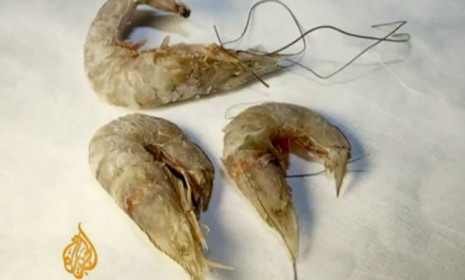BP oil spill: The 'horribly mutated' creatures living in the Gulf
Fish, shrimp, and crabs are missing eyes and suffering strange deformities, according to a harrowing new report — yet the FDA insists the seafood's safe to eat

A free daily email with the biggest news stories of the day – and the best features from TheWeek.com
You are now subscribed
Your newsletter sign-up was successful
Shrimp born without eyes, clawless crabs, and fish with visible tumors are among the "horribly mutated" marine animals found in the waters off the Gulf Coast, according to a new report from Al Jazeera. Scientists say the problem is a side effect of the April 2010 explosion of BP's Deepwater Horizon oil rig, which killed 11 people and spilled at least 4.9 million barrels of oil into the ocean. Here, a brief guide to the damage:
Is it just the oil that caused mutations?
No. Also to blame are the nearly 2 million gallons of chemical dispersants, such as petroleum distillates and 2-butoxyethanol, used for the subsequent clean-up. The solvents used in the aftermath of the spill, long known to be "mutagenic," are powerful enough to dissolve oil, grease, and rubber, says Casey Chan at Gizmodo. That's great for sopping up oil, "but terrible for the environment."
The Week
Escape your echo chamber. Get the facts behind the news, plus analysis from multiple perspectives.

Sign up for The Week's Free Newsletters
From our morning news briefing to a weekly Good News Newsletter, get the best of The Week delivered directly to your inbox.
From our morning news briefing to a weekly Good News Newsletter, get the best of The Week delivered directly to your inbox.
What kinds of deformities are cropping up?
Among the disturbing mutations: Shrimp with tumors on their heads; fish that lack eyes or are missing flaps over their gills; fish with oozing sores; crabs with holes in their shells; crabs that are missing claws and spikes, or are encased in soft shells instead of hard ones. "I've never seen anything like this," Dr. Jim Cowan of Louisiana State University tells Al Jazeera. "The fishermen have never seen anything like this."
How has this affected the fishing industry?
The Gulf of Mexico supplies more than 40 percent of all commercial seafood in the continental U.S. "At the height of the last shrimp season, in September, one of our friends caught 400 pounds of [eyeless shrimp]," Louisiana fisher Tracy Kuhns tells Al Jazeera. At least 50 percent of shrimp caught in Barataria Bay, a popular shrimping destination heavily impacted by the spill, were found to be missing their eyes during that period. Yet the Louisiana government maintains that its fish is safe to eat.
A free daily email with the biggest news stories of the day – and the best features from TheWeek.com
Is there any other evidence of mutations?
A separate survey from the University of South Florida found that two to five percent of the fish in the Gulf were found to have skin lesions or sores following the spill. Before the Deepwater Horizon disaster, that figure was just one-tenth of 1 percent.
What does BP say?
"Seafood from the Gulf of Mexico is among the most tested in the world," the energy company says in a statement. And "according to the FDA and NOAA, it is as safe now as it was before the accident." Still, on Wednesday, BP reached a $7.8 billion out-of-court settlement with lawyers representing thousands of individuals and businesses affected by the disaster. The Gulf seafood industry will reportedly receive $2 billion in compensation.
Sources: Al Jazeera, Discovery, Gizmodo, My Fox Houston, News.com
-
 Why are election experts taking Trump’s midterm threats seriously?
Why are election experts taking Trump’s midterm threats seriously?IN THE SPOTLIGHT As the president muses about polling place deployments and a centralized electoral system aimed at one-party control, lawmakers are taking this administration at its word
-
 ‘Restaurateurs have become millionaires’
‘Restaurateurs have become millionaires’Instant Opinion Opinion, comment and editorials of the day
-
 Earth is rapidly approaching a ‘hothouse’ trajectory of warming
Earth is rapidly approaching a ‘hothouse’ trajectory of warmingThe explainer It may become impossible to fix